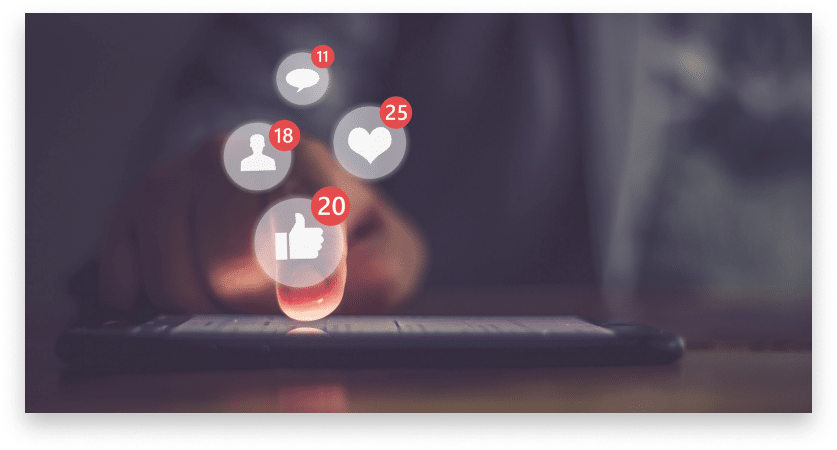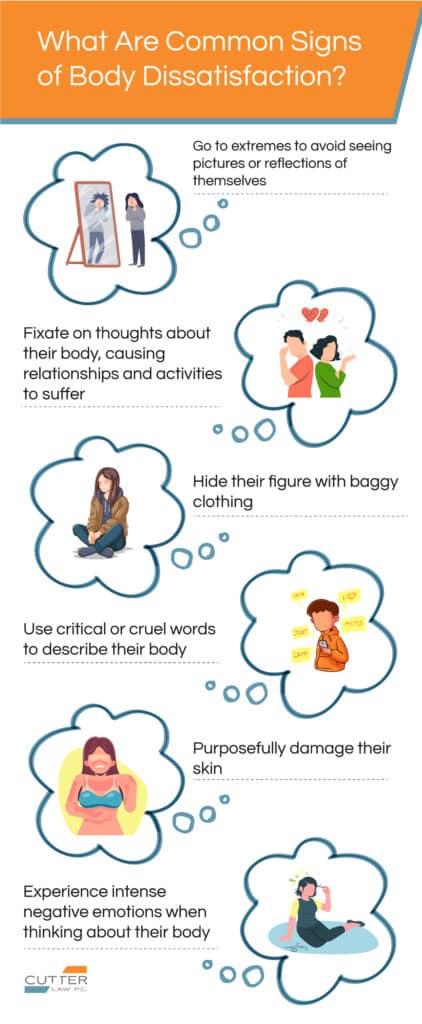Social Media and Body Image
A dangerous connection is developing between social media and body image. Pictures of “perfect” bodies are everywhere, drawing adoration and compliments. As a result, teens and adults compare themselves to these idealized bodies and feel self-critical. For many, those feelings intensify into dangerous and potentially life-threatening mental health challenges, including eating disorders, anxiety, and depression. At Cutter Law, we’re working hard to hold social media companies responsible for this vicious cycle.
Social media has changed our world, and not entirely for the better. Digitally altered images of perfect bodies saturate Instagram feeds. Celebrity TikTokers share photos of their fitness journeys, inspiring some but causing others to feel guilty and ashamed.
For some people, these critical thoughts turn into destructive body image issues. The experienced attorneys at Cutter Law have helped many people in California to fight against this pattern by filing lawsuits against big social media companies. If you struggle with social media and body image, our trusted lawyers are here to stand with you. You’re not alone.
Quick Links
How Common Are Body Image Issues?
Research has suggested that 20 to 40 percent of women and 10 to 30 percent of men feel dissatisfied with their bodies. Body image issues can happen at any age, though some research has found that younger people are more vulnerable to body image concerns.
Body image issues are even more prevalent among children and teenagers. A recent poll from the C.S. Mott Children’s Hospital at the University of Michigan surveyed a national sampling of parents with children ages 8 to 18. Almost two-thirds of parents reported that their children struggle with concerns about their appearance. Teen girls had the highest prevalence of body image issues at 73 percent, with teen boys coming in a close second at 69 percent.

How Does Social Media Affect Body Image?
Social media is a part of daily life for most Americans. More than 70 percent of people nationwide use sites like TikTok, Facebook, and Instagram, though younger people log on in more significant numbers. Approximately 84 percent of 18-to-29-year-olds and 81 percent of 30-to-49-year-olds are on social media.
Three-quarters of U.S. teens have at least one social media profile, and more than half use it daily. In addition, two-thirds have almost constant access to the Internet via their smartphone. Given this broad reach, it’s not surprising that social media platforms have impacted how people view themselves.
Internalization of Appearance Ideals
Social media is full of images depicting idealized and objectified bodies, all receiving positive comments. Repeated exposure to these images can change how teens and adults feel about their bodies. In the University of Michigan report, parents of self-conscious children were twice as likely to report negative effects from social media.
Comparison and Self-Criticism
Research has shown that increased social media use leads teen girls to internalize the ideals of thinness. They compare themselves to others more often and report more body dissatisfaction. Boys are more likely to idealize muscularity.
Adults are also at risk. One study reviewed more than 1,000 volunteers between the ages of 15 and 35, 193 of whom had eating disorders. Researchers found that participants had higher rates of body dissatisfaction when they compared themselves more frequently to people they follow on social media.
Health Becoming Unhealthy
The “fitspiration” trend is particularly dangerous. Fitspiration, or fitspo, involves posting “inspirational” images and motivational messages to encourage healthy eating.
Unfortunately, researchers have found that exposure to Fitspo content often hurts a person’s self-image, especially among users who tend to compare themselves with others. Again, the trend was more pronounced among younger users.
Health and fitness themselves aren’t the problem. The problem is that social media presents users with perfectly toned bodies without providing context, leading people to feel less inspired and more inadequate.
What Are Common Signs of Body Dissatisfaction?

Social media and body image can be a dangerous mix. According to Healthline, people with a negative body image may:
- Go to extremes to avoid seeing pictures or reflections of themselves
- Fixate on thoughts about their body, causing relationships and activities to suffer
- Hide their figure with baggy clothing
- Use critical or cruel words to describe their body
- Purposefully damage their skin
- Experience intense negative emotions when thinking about their body
Some people have these experiences more intensely than others. In some cases, they can escalate into health risks.
What Are the Consequences of Body Image Concerns?
Body image dissatisfaction is about more than just “feeling bad.” It severely impacts a person’s mental and physical health and can lead to medically dangerous restricted eating in worst-case scenarios. Research has linked body dissatisfaction to severe illnesses such as:
- Body dysmorphic disorder: A preoccupation with perceived physical flaws
- Muscle dysmorphia: An extreme need to build muscle
- Anorexia nervosa: Restriction of food intake and the fear of gaining weight
- Bulimia nervosa: Compulsive bingeing and purging
- Obsessive-compulsive disorder: The persistence of intrusive thoughts and the need to perform behaviors to eliminate them
These illnesses affect a person’s long-term quality of life. For example, those with body dysmorphic disorder have a higher risk of unemployment and higher divorce rates than the general population. Approximately 20 percent of people with eating disorders never fully recover.
In extremely severe cases, body image issues from social media overuse can lead to suicide.
How Do You Help Someone With Body Image Issues?
It’s never too soon to seek help for body image issues. If you or your child has a diagnosed eating disorder or is at risk for unhealthy behaviors, it’s time to take action.
A positive first step is to cut down on social media use. In a study published by the American Psychological Association, adolescents and young adults who cut their social media use by half reported a significant improvement in how they felt about their bodies.
Studies also show that proactive body appreciation and body positivity can protect against the negative effects of social media exposure. The University of Michigan researchers urge parents to model self-acceptance and challenge unattainable media ideals. Those conversations may include discussing digital image editing or the toxic nature of many image-altering trends.
If someone you love shows signs of body image issues, talk to them about reality, unreality, and the healthy differences between them.
What are Some Resources for Those Experiencing Body Image Issues?
Help and support are available for people who struggle with body image dissatisfaction from the following sources:
- The National Eating Disorders Association Helpline
- The National Association of Anorexia Nervosa and Associated Disorders Helpline
- Psychology Today’s therapist search tool
- The National Suicide and Crisis Lifeline (Call 988)
People who have body image issues may resist getting help. If you or someone you love struggles with body issues, any movement toward change is worth celebrating.
What Are the Legal Options for Those Harmed by Social Media?
As people learn more about the dangers of social media addiction, more individuals and families choose to pursue legal action. In 2022, social media users filed lawsuits against Meta, the parent company of Facebook and Instagram. They claimed that the addictive potential of these sites endangered the well-being and lives of children and adolescents.
Users have also taken legal action against TikTok and Snapchat for failing to protect children and young adults from the dangers of social media use. These lawsuits hold social media companies accountable for their dangerous actions. They demand that big companies stop putting people’s mental health at risk for the sake of profit.
If you or someone you love is struggling with body image issues or other mental or physical health challenges from social media use, Cutter Law can help. We’ve represented people of all ages in social media lawsuits and continue to fight to make the Internet safer.
Call today for your free consultation. There’s no fee unless we win.
Schedule A Free Case Review
"*" indicates required fields
Our Office Locations
Sacramento Office
401 Watt Avenue Suite 100
Sacramento, CA 95864
Phone: 916-290-9400
Oakland Office
Cutter Law P.C.
1901 Harrison Street Suite 910
Oakland, CA 94612


